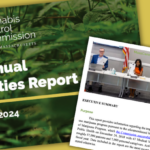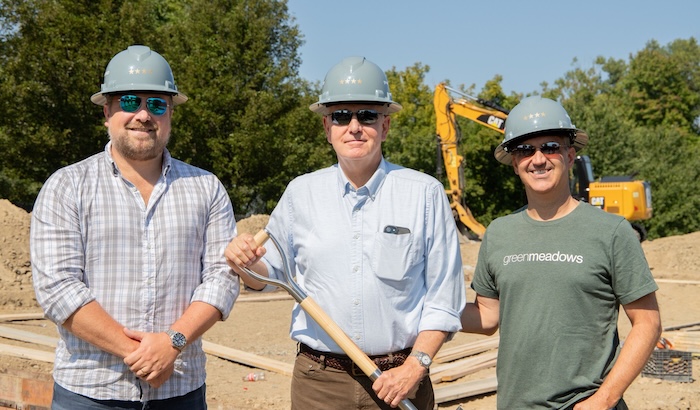
“Social equity, craft, and disadvantaged business operators should be driving the discussion on how to design a national regulatory framework for cannabis.”
The Parabola Center for Law and Policy wants to show how a regional or even nationwide cannabis supply chain could look without massive corporations dominating the entire process.
“There needs to be a unified voice that is free of corporate influence or funding,” said Shaleen Title, CEO of the Parabola Center, a nonprofit think tank that launched earlier this year to push for stronger social equity policies and greater market access for small businesses within cannabis. Title is a longtime advocate and served as a commissioner of the Cannabis Control Commission from 2017 to 2020.
The corporate model in legal cannabis tends to be one company, such as Curaleaf or Trulieve controlling cultivation, manufacturing, distribution, and retail. The alternative that Parabola Partners is hoping to present would also lay the groundwork for an interstate network of cannabis commerce in the event that either rescheduling from the Biden administration or federal court rulings opens the floodgates for legal transport of cannabis from one part of the country to another.
Parabola’s new project already has 50 companies and organizations on board that cross the spectrum of plant-touching and ancillary cannabis businesses. They also hope to bring on an additional 50 members in the first half of 2023.
The time is especially crucial, as the highest paid legal weed lobbyists in DC are currently scrambling to get banking reforms while the Democrats still control the House.
“The best way to push for a model of federal legalization that protects small cannabis businesses is to listen to the thousands of them who already exist,” Title said. “Social equity, craft, and disadvantaged business operators should be driving the discussion on how to design a national regulatory framework for cannabis. That’s why we listen to them and specifically reject the corporate, pro-monopoly model as well as the big money pushing it.”
The first step for the new program has been establishing the boundaries of who it will work with. Specifically, Parabola will not work with any organizations or cannabis companies that have opposed home growing, sued over regulations that favor social equity, or called for criminal crackdowns on those in the legacy market.
“We will not partner or take money from organizations that violate any of those three,” Title said.
From there, Parabola will continue to provide networking opportunities for its membership, which it hopes to continue to grow, before it starts the process of developing policy goals on the national level as the federal government continues to slowly lurch toward legalization.
“That community piece is really the key here for us because one of the things that we hold dear that is really important to us, is partnerships,” said Liam O’Brien, co-founder of Fernway, a cannabis manufacturing company that specializes in vapes. “We partner with a lot of different businesses in all different areas of the supply chain. In order for us to do that, we have to identify communities, but we also have to build them.”
After bolstering a community in legal cannabis, the group hopes to establish an educational base for federal legalization that allows smaller businesses to compete with the corporate multi-state organizations who already have vibrant lobby operations.
“We’re partnering with Parabola Center because we believe that with our collective power, we can do better than ‘business as usual’ models that prioritize greed above all else, failing the majority of Americans time and time again,” said Natacha Andrews, founder of the National Associationof Black Cannabis Lawyers. “Federal cannabis legalization has the potential to be a game-changer for civil rights, if we are intentional and work together.”
With or without the federal government allowing interstate commerce, Liam noted that simply building a networking community has other positives.
“I can say personally, I’ve always gotten great benefit from looking outside of the state to see what lessons I can learn from other businesses,” he said.
During Title’s years as one of the original members of the state cannabis commission, she said a majority of the strong policy ideas the CCC considered were generated directly from small operators, such as those she hopes to attract to Parabola’s new program.
“It’s continuing the same type of work that the Parabola Center has been doing, but making sure we have those voices at the center of the conversation,” she said.
A list of the 50 small companies and organizations they are partnering with “in supporting policy solutions at the federal level that prevent marijuana monopolies and support a fair, competitive marketplace” can be found below and at parabolacenter.com/partners.
-
Alliance for Cannabis Transparency (ACT)
-
Ardent
-
Bay State Extracts
-
Big Hope Project
-
Blackstone Valley
-
The Boston Garden
-
Burn After Reading
-
Calyx Berkshire
-
Civera Software
-
COAST Cannabis Co
-
Cristina Buccola Counsel
-
Different Leaf
-
EOS Farms
-
Fernway
-
Freshly Baked
-
Garden Remedies
-
The Green Approach Trading Post (TGA)
-
Hammerhead Strategies
-
The Healing Rose
-
The High End
-
The Honeybee Collective
-
KindRun
-
Legally Great Academy
-
LOWD
-
Marijuana Justice
-
Mary and Main
-
The Mensing Group
-
MCR Labs
-
National Association of Black Cannabis Lawyers (NABCL)
-
National Cannabis Craft Coalition
-
Nuve
-
Paper Crane Cannabis
-
Park Jordan
-
Point Seven Group
-
Raven Grass
-
Rolling Releaf
-
Sativa Remedy
-
Stem Haverhill
-
Stonedware
-
Strain Station
-
Students for Sensible Drug Policy (SSDP)
-
Supernova Women
-
THC Staffing
-
Trella Tech
-
Top Flor
-
Terptown Throwdown
-
Underground Legacy
-
Vermont Growers Association
-
Veridis Quo
-
Victoria Litman Law






















